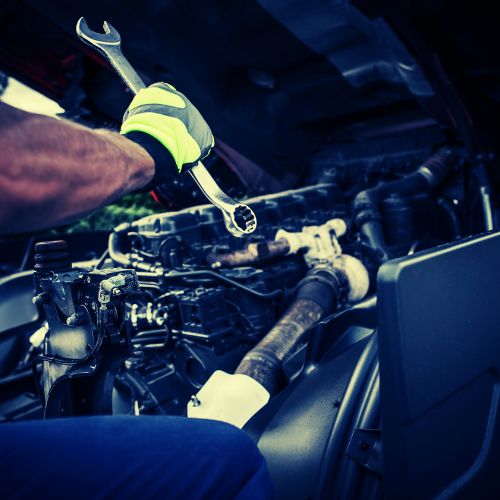Mastering Small Repairs: A Guide for New Truck Drivers
For new truck drivers, the road ahead can seem daunting, especially when unexpected mechanical issues arise. Knowing how to perform basic repairs not only keeps your truck moving but also saves time, money, and stress. In episode 2 of the Miles and Mentors Podcast, Mark Reeder shared practical advice from his years of experience at Hoyt’s Truck Center, emphasizing the importance of learning small, impactful repairs.
Whether it’s fixing a minor leak or replacing a fuel filter, mastering these skills can significantly reduce downtime and help new drivers build confidence in their trucking careers.

Why Small Repairs Matter
Mark Reeder was clear in his interview: “If you can fix an airline or change a filter yourself, you avoid costly service calls.” Trucking is a business where every minute counts, and minor issues can snowball into significant problems if left unattended. Knowing how to tackle basic repairs allows you to stay on schedule, meet delivery deadlines, and maintain your earnings.
Additionally, small repairs often come at a premium when handled by repair shops, especially during off-hours. By equipping yourself with the right skills, you can save hundreds—even thousands—over time.
Essential Repairs Every New Driver Should Learn
Mark’s advice, combined with industry best practices, highlights these key areas for new truck drivers:
1. Fixing Minor Leaks
Leaky hoses or connections are common on the road. Learn to identify leaks and address them with clamps or repair kits. Carrying spare hoses and a repair kit in your truck can be a lifesaver.
Pro Tip: Always check for leaks during your pre-trip inspections, focusing on airlines and coolant hoses.
2. Replacing Fuel and Air Filters
Dirty or clogged filters reduce engine performance and fuel efficiency. Learning to replace air and fuel filters ensures your engine breathes and runs smoothly.
Mark’s Insight: Replacing filters is a straightforward process and can save you from paying $200 an hour for basic work at a repair shop.
3. Patching Tires
While major tire repairs require professionals, small punctures can be temporarily patched. This quick fix can get you to the nearest service station without a costly roadside call.
Safety Tip: Always carry a tire repair kit and learn how to safely use it before attempting a patch on your own.
4. Replacing Light Bulbs
Burnt-out headlights, brake lights, or turn signals can lead to fines and unsafe driving conditions. Keep spare bulbs in your truck and learn how to replace them on the go.
Quick Fix: Use your truck manual as a guide to identify the correct bulbs and replacement procedures.
5. Adjusting Loose Components
Loose nuts, bolts, and fittings can rattle and cause damage over time. Regularly inspect and tighten components like mirrors, license plates, and bumpers.
Mark’s Advice: A small toolkit with wrenches and screwdrivers is all you need for these adjustments.
Pre-Trip Inspections: The Foundation of Small Repairs
Mark emphasized the importance of daily pre-trip inspections as a proactive way to identify issues early. A thorough inspection should include:
- Fluid Levels: Check engine oil, coolant, brake fluid, and power steering fluid.
- Tires: Monitor pressure, tread depth, and look for visible damage.
- Lights and Signals: Test all exterior lights for proper functionality.
- Hoses and Belts: Look for cracks, fraying, or leaks.
By catching minor issues before they escalate, you save both time and money.

Essential Repairs Every New Driver Should Learn
Mark’s advice, combined with industry best practices, highlights these key areas for new truck drivers:
1. Fixing Minor Leaks
Leaky hoses or connections are common on the road. Learn to identify leaks and address them with clamps or repair kits. Carrying spare hoses and a repair kit in your truck can be a lifesaver.
Pro Tip: Always check for leaks during your pre-trip inspections, focusing on airlines and coolant hoses.
2. Replacing Fuel and Air Filters
Dirty or clogged filters reduce engine performance and fuel efficiency. Learning to replace air and fuel filters ensures your engine breathes and runs smoothly.
Mark’s Insight: Replacing filters is a straightforward process and can save you from paying $200 an hour for basic work at a repair shop.
3. Patching Tires
While major tire repairs require professionals, small punctures can be temporarily patched. This quick fix can get you to the nearest service station without a costly roadside call.
Safety Tip: Always carry a tire repair kit and learn how to safely use it before attempting a patch on your own.
4. Replacing Light Bulbs
Burnt-out headlights, brake lights, or turn signals can lead to fines and unsafe driving conditions. Keep spare bulbs in your truck and learn how to replace them on the go.
Quick Fix: Use your truck manual as a guide to identify the correct bulbs and replacement procedures.
5. Adjusting Loose Components
Loose nuts, bolts, and fittings can rattle and cause damage over time. Regularly inspect and tighten components like mirrors, license plates, and bumpers.
Mark’s Advice: A small toolkit with wrenches and screwdrivers is all you need for these adjustments.
Building Confidence on the Road
Learning small repairs isn’t just about saving money—it’s about building confidence. Mark described how drivers who can address minor issues feel more in control and less stressed, even during challenging situations.
Start with simple tasks, use your truck’s manual as a guide, and don’t hesitate to ask seasoned drivers or repair shop professionals for advice.

The Payoff of Small Repairs
By mastering these skills, you’re not only reducing downtime and expenses but also establishing yourself as a reliable and resourceful driver. As Mark Reeder shared, these quick-fix abilities are the hallmark of successful owner-operators.
Practical Lessons to Drive Your Success
The knowledge Mark shared during his Miles and Mentors Podcast interview serves as a reminder: small repairs can have a big impact. Take time to learn these essential skills, build a basic toolkit, and perform thorough pre-trip inspections.
For more tips from Mark Reeder, check out episode 2 of the Miles and Mentors Podcast. His insights will help you navigate your career with confidence and efficiency.
